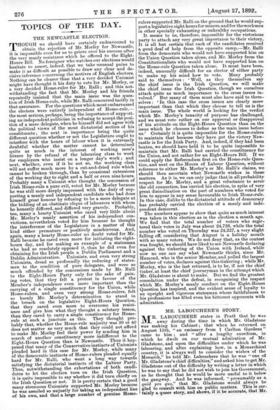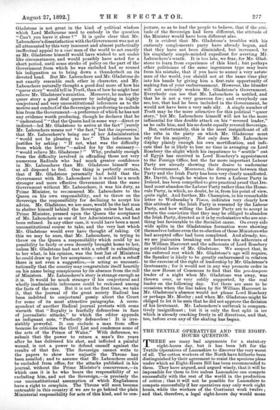MR. LABOITCHERE'S STORY.
MR. LABOTTCHERE states in Truth that he was away during the time in which Mr. Gladstone was making his Cabinet ; that when he returned on August 15th, "an emissary from 1 Carlton Gardens" came to him and "after a lengthy exordium, in which he dwelt on our mutual admiration of Mr. Gladstone, and upon the difficulties under which he was labouring, and after explaining how, in a Monarchical country, it is always well to consider the wishes of the Monarch," he told Mr. Labouchere that he was "one of Mr. Gladstone's chief difficulties," and asked him to get Mr. Gladstone out of the difficulty by writing a letter in which he was to say that he did not wish to join his Government. as he thought that he would be more useful to it below the gangway. And he was informed, "presumably as a quid pro quo," that Mr. Gladstone would always be glad to consult with him on public matters. This is cer- tainly a queer story, and shows, if it be accurate, that Mr. Gladstone is not great in the kind of political wisdom which Lord Melbourne used to embody in the question "Can't you leave it alone ? " It is quite clear that Mr. Labouchere's dissatisfaction with the Government was not at all attenuated by this very innocent and almost pathetically ineffectual appeal to a rust man of the world to act exactly as Mr. Gladstone himself would have wished to act under like circumstances, and. would possibly have acted for a short period, until some stroke of policy on the part of the Government from which he was excluded had so roused his indignation as to bring down a thunderbolt on its devoted head. But Mr. Labouchere and Mr. Gladstone do not exactly resemble each other in character, and Mr. Labouchere naturally thought a good deal more of how his "queer story" would tell in Truth, than of how he might best relieve Mr. Gladstone's anxieties. Moreover, he makes the queer story a good deal queerer by indulging in highly conjectural and very unconstitutional inferences as to the motive and conduct of the Sovereign in preferring to exclude him from the Government—a preference of which he has not any evidence worth producing, though he declares that he " understood " "that the Queen had in some way—direct or indirect—led Mr. Gladstone to arrive at the fact" [surely Mr. Labouchere means not "the fact," but the impression] that Mr. Labouchere's being one of her Administration 'would not be pleasing to her." This inference he justifies by asking : "If not, what was the difficulty from which the letter "—asked for by the emissary— "would relieve Mr. Gladstone ? " Why, probably enough from the difficulty involved in offending those not very numerous Radicals who had much greater confidence in Mr. Labouchere than Mr. Gladstone himself was at all disposed to feel. One thing is perfectly certain, that if Mr. Gladstone personally had held that the Government with Mr. Labouchere in it would be a much stronger and more effective Government than the same Government without Mr. Labouchere, it was his duty, as Prime Minister, to recommend Mr. Labouchere to the Queen on his own responsibility, and to throw on the Sovereign the responsibility for declining to accept his advice. Mr. Gladstone, we are sure, would be the last man to shelter himself behind the Sovereign unless he had, as Prime Minister, pressed upon the Queen the acceptance of Mr. Labouchere as one of her Administration, and had been refused. In any other case, it would have been a most unconstitutional course to take, and the very last which Mr. Gladstone would ever have thought of taking. Of this we may be sure, that Mr. Labouchere, in trying to throw on the Queen a responsibility which could by no possibility be fairly or even decently brought home to her, unless Mr. Gladstone had met with a rebuff in submitting to her what, in his opinion, was the best list of Ministers he could draw up for her acceptance,—and of such a rebuff there is not even a suggestion,—is acting so unconsti- tutionally that the country may congratulate itself heartily on his name being conspicuous by its absence from the roll of Ministers. Mr. Labouchere's story is strange enough as it is. It would be much stranger if his conjectural and wholly inadmissible inferences could be reckoned among the facts of the case. But it is not the first time, we take it, that the journal of the great society Radical has been indebted to conjectural gossip about the Court for some of its most attractive paragraphs. A corre- spondent of another Radical journal protests with some warmth that "Royalty is fearfully defenceless in face of journalistic attacks," to which the editor appends an indignant note, "Perfectly defenceless ! It is irre- sistibly powerful. It can exclude a man from office because he criticises the Civil List and condemns some of the acts of the Prince of Wales." With deference, we submit that the power to return a man's fire years after he has delivered his shot, and inflicted a painful wound, is not a power to defend oneself against the results of that fire. The Sovereign cannot write to the papers to show how unjustly the Throne has been assailed ; and to assume that Mr. Labouchere could be excluded from office, for the attacks published in his journal, without the Prime Minister's concurrence,—in which case it is he who bears the responsibility of so excluding him, and not the Sovereign,—is precisely the one unconstitutional assumption of which Englishmen have a right to complain. The Throne will soon become untenable in this country if we are to go behind the plain Ministerial responsibility for acts of this kind, and to con- jecture, so as to lead the people to believe, that if the atti- tude of the Sovereign had been different, the attitude of the Minister would have been different also.
It is evident that Mr. Gladstone's troubles with his curiously conglomerate party have already begun, and that they have not been diminished, but increased, by his singularly simple-minded expedient for averting Mr. Labouchere's wrath. It is too late, we fear, for Mr. Glad- stone to learn from experience of this kind ; but perhaps other politicians of the same ingenuous type may learn from his mistake, that if you have to annoy a very astute man of the world, you should not at the same time play into his hands by giving him a first-rate opportunity of making fun of your embarrassment. However, the blunder will not seriously weaken Mr. Gladstone's Government. Everybody can see that Mr. Labouchere is nettled, and that he is not a very generous foe ; and everybody can see, too, that had he been included in the Government, he would not have been a very safe ally. A single number of Truth may be the more attractive for this political "queer story," but Mr. Labouchere himself will not be the more influential for this double attack on his "revered leader," as he calls him, and his no doubt equally revered Sovereign. But, unfortunately, this is the most insignificant of all the rifts in the party on which Mr. Gladstone must rely for his. majority. Not only does Mr. Labouchere display plainly enough his own mortification, and indi- cate that he is likely to lose no time in avenging on Lord Rosebery the slight which his impatience to " scuttle " out of Egypt has received in Lord Rosebery's appointment to the Foreign Office, but the far more important Labour Party are already showing their desire to undermine the Government. Moreover, the divergence between that Party and the Irish Party has been very clearly manifested. Mr. Davitt, though he wishes to form a Labour Party in Ireland, has been compelled to give practical proof that Ire- land must abandon the Labour Party rather than the Home- rule Party, in which, no doubt, he is, from his point of view, quite right. And further, Mr. Champion, in his remarkable letter to Wednesday's Times, indicates very clearly how this attitude of the Irish Party is resented by the Labour Party, and how willing the Labour Party are to accept in return the conviction that they may be obliged to abandon the Irish Party, directed as it is by ecclesiastics who are any- thing but favourable to the Socialist cause. On every side wide splits in the Gladstonian formation were showing. themselves before even the re-election of those Ministers who had accepted office had been completed. And already, too, we see jealousies breaking out between the adherents of Sir William Harcourt and the adherents of Lord Rosebery as political heirs of Mr. Gladstone. We suspect that, in the enforced rest which Mr. Gladstone's age will require, the Speaker is likely to be greatly embarrassed in relation to the exercise of the right of leadership by Mr. Gladstone's lieutenants ; for it would not in any way promote order in the new House of Commons to find that the pro-tempore leader of a night when Mr. Gladstone was away, was thrown over, or very coldly supported, by the real leader on the following day. Yet there are sure to be occasions when the line taken by Sir William Harcourt in Mr. Gladstone's absence would not please Lord Rosebery or perhaps Mr. Morley ; and when Mr. Gladstone might be obliged to let it be seen that he did not approve the decision of his lieutenant. Mr. Labouchere's outbreak is compara- tively insignificant ; but it is only the first split in ice which is already cracking freely in all directions, and that, too, before even any of the skating has begun.



































 Previous page
Previous page